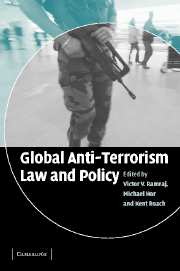Book contents
- Frontmatter
- Contents
- List of contributors
- Acknowledgements
- 1 Introduction
- PART ONE Theoretical Perspectives on Anti-Terrorism Law and Policy
- PART TWO A Comparative Study of Anti-Terrorism Measures
- PART THREE Anti-Terrorism Law and Policy in Asia
- PART FOUR Regional Cooperation
- PART FIVE Anti-Terrorism Law and Policy in the West
- PART SIX Anti-Terrorism Measures in Africa, the Middle East and Argentina
- 25 Terrorism and governance in South Africa and Eastern Africa
- 26 Rocks, hard places and human rights: anti-terrorism law and policy in Arab states
- 27 Terrorism in Argentina: government as its own worst enemy
- 28 Postscript: Some recent developments
- Index
26 - Rocks, hard places and human rights: anti-terrorism law and policy in Arab states
Published online by Cambridge University Press: 21 July 2009
- Frontmatter
- Contents
- List of contributors
- Acknowledgements
- 1 Introduction
- PART ONE Theoretical Perspectives on Anti-Terrorism Law and Policy
- PART TWO A Comparative Study of Anti-Terrorism Measures
- PART THREE Anti-Terrorism Law and Policy in Asia
- PART FOUR Regional Cooperation
- PART FIVE Anti-Terrorism Law and Policy in the West
- PART SIX Anti-Terrorism Measures in Africa, the Middle East and Argentina
- 25 Terrorism and governance in South Africa and Eastern Africa
- 26 Rocks, hard places and human rights: anti-terrorism law and policy in Arab states
- 27 Terrorism in Argentina: government as its own worst enemy
- 28 Postscript: Some recent developments
- Index
Summary
Introduction
This chapter provides an overview of legislative developments in Arab states following the passage of Security Council resolution 1373 (2001), focusing on definitions of ‘terrorism’ and ‘terrorist’ offences. It considers the Arab Convention for the Suppression of Terrorism before proceeding to review the responses of a number of individual states. Moves towards political reform and the opening of public space for dissent and criticism are challenged by the exigencies of the ‘war on terror’. Certain practices in violation of human rights in Arab states have apparently been endorsed by the US alongside a newly stated policy focus on ‘democratization’ in the region. Dissonance between law-related word and deed of the states leading the ‘war on terrorism’ – particularly the US, but also the UK – sustains the arguments of those who seek to undermine the discourse of rights and rule of law, complicates the considerable challenges posed to local and regional human rights groups, and seriously undermines the credibility of international law in the region; the efficacy of all of which in the ‘global war on terrorism’ must surely be open to question.
Regional context
The US overview of Patterns of Global Terrorism for 2003 confirmed that ‘the Middle East continued to be the region of greatest concern in the global war on terrorism’. At the same time, it is the lives and freedoms of the populations of Arab states in the region that have probably been the most directly affected by the anti-terrorism laws and policies being implemented and promoted by the US since 9/11. Uncounted thousands of non-combatants have been killed by the US-led forces in Afghanistan and Iraq.
- Type
- Chapter
- Information
- Global Anti-Terrorism Law and Policy , pp. 581 - 608Publisher: Cambridge University PressPrint publication year: 2005
- 3
- Cited by

